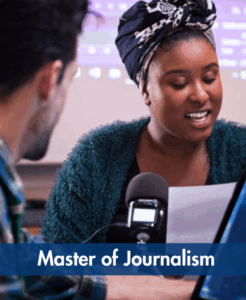Minimum admission requirements
While King’s graduate and advanced programs have specific admission requirements, there are some criteria that must be met by all applicants.
Advanced degree(One-year Bachelor of Journalism) |
Masters degree(Master of Journalism, Master of Fine Arts) |
|---|---|
| Three/four-year bachelor’s degree (or equivalent) | Four-year bachelor’s degree (or equivalent) |
| Minimum grade point average of 3.0 (B average) in the last 60 credit hours of study | Minimum grade point average of 3.0 (B average) in the last 60 credit hours of study |
| Degree granted by a university of recognized standing | Degree granted by a university of recognized standing |
- Applicants must meet English language proficiency requirements
- Applicants must submit all application supporting documents by the dates indicated on the Admissions Dates and Deadlines page
Meeting minimum admission requirements does not guarantee admission to all advanced and graduate programs. The number of places in each program is limited, so it is expected that only a proportion of qualified applicants will be admitted; selection will be made on a competitive basis. If offered a place, students need to confirm acceptance of the offer and provide an admission deposit by a specified deadline to hold a place in the program. Applications are reviewed on a rolling basis.
All documents received become the property of the university and will be used at its discretion for internal purposes only. Documents will not be returned.
The University of King’s College is committed to helping tackle the unique challenges that can arise for students who have been forcibly displaced (due to violence, persecution, human rights violations, etc.), or affected by natural hazards, disasters and man-made environmental impacts. If you are experiencing a humanitarian crisis and face barriers to completing your application to King’s (which would include providing official academic documentation) please email admissions@ukings.ca.
|
Questions? Please connect with the Admissions team at admissions@ukings.ca | 902-422-1271 |
For more program-specific requirements, please click one of these images:
 |
 |
 |